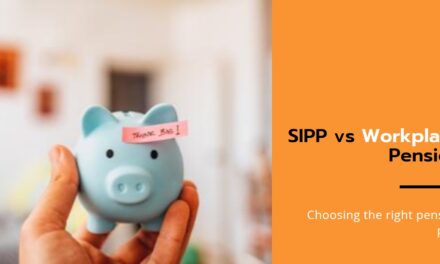How do scammers target SIPPs and pensions, and how can you go about avoiding SIPP scams?
I break down the 4 most common SIPP scams and what steps you can take to not fall into the traps.
Thankfully, SIPP providers have lots of protection in place to stop scammers from accessing your money – even if they do somehow manage to gain access to your SIPP account.
For example, most providers will not let you withdraw money to a new bank account that they haven’t already verified with you via post – and when you do change your bank account, you’ll get notified in every way possible in case it wasn’t from your instruction.
That said, it’s important to always be cautious, and there other tricks to watch out for.
Are there SIPP scams?
Yes, there are. It’s an unfortunate reality that scammers target pensions, including SIPPs – the hard-earned retirement savings of everyday people.
There are always new methods scammers are coming up with, and I go over the most common current scams in this guide.
However, here is my number 1 golden rule for avoiding SIPP scams:
Never follow a link to log into your SIPP account
I can’t stress this point enough.
Whether it’s through an email you’ve received, a text message to your phone, or any other kind of link you’ve received supposedly from your SIPP provider – don’t log into your account through it.
This goes for your SIPP provider or any other kind of financial or personal account you own.
Instead, go to your search engine (like Google), type in the name of your SIPP provider, click the top result (try to avoid the paid ads at the very top of search engine results), and then log in that way.
This way you know that you’re logging in through the genuine website (Google has strict safety features in place), and if there’s a genuine reason you need to access your account, you’ll be able to find it.
For example, say you receive an email from your SIPP provider saying that you’ve got an unread message in your account.
This sounds innocent enough – they’re not offering you money to tempt you in, they’re not trying to panic you into clicking by giving you a warning – it’s just a simple notification saying you’ve got a message to read and you need to log in.
But this is exactly what you need to look out for – when you least suspect it!
If you follow a link, it could be what’s called a ‘phishing link’. The link goes to a fake website that’s designed to look like your SIPP provider’s login page. You log in, and your password will be declined. You’ll try a few times in frustration before giving up.
Well, the reason it’s declined is that it’s not a genuine website, and unfortunately, that website owner could now have your password and log into your account – and you might not even put two and two together and realise what’s happened!
So, even if you’re confident that it’s a genuine email or message, I always recommend going through a Google search to locate your account and log in. And if it’s really important, your SIPP provider will write to you in the post.
If you’re worried that you’ve entered your password into a fraudulent website, contact your SIPP provider immediately to change your password and follow any other recommendations they have.
What are some examples of pension scams?
Let’s dive into some common SIPP scams and explore how to avoid them:
- Phishing emails and cold calls
As mentioned above, scammers pose as legitimate pension providers or advisers.
How to avoid: Never provide personal information to unsolicited callers or emailers. Verify the legitimacy of the company by researching them online or contacting them through their official website or phone number via a Google search. If you’re unsure of the legitimacy of a particular SIPP provider or Financial Adviser, look them up on the FCA register. - Investment scams
These scams often involve high-risk or unregulated investments like overseas property, forestry, or storage units. The investments might seem too good to be true – and they usually are.
How to avoid: Always research an investment opportunity thoroughly before committing any funds. Check the Financial Conduct Authority (FCA) register to ensure the company is regulated, and seek independent financial advice if you’re unsure. - Pension liberation scams
Scammers promise to unlock your pension before the age of 55, which is illegal in most cases. You’ll end up with hefty tax penalties and no pension.
How to avoid: Be sceptical of anyone offering to access your pension early. It’s generally not allowed, and you risk losing your entire pension along with facing significant tax penalties. Consult a reputable financial adviser if you have questions about accessing your pension. - Fraudulent pension providers
Fake pension providers set up convincing websites and offer attractive deals, only to steal your money.
How to avoid: Double-check the legitimacy of a pension provider by looking for their registration with the FCA. It’s also a good idea to research online reviews and ask for recommendations from friends or family too.
Here’s a table that outlines some key warning signs, tips to avoid scams, and steps to take if you suspect a scam:
| Warning Signs of Pension Scams | Tips to Avoid Pension Scams | Steps to Take if You Suspect a Scam |
|---|---|---|
| Unsolicited contact (phone, email, or text) | Do not share personal or financial information with unknown contacts | Report to the authorities (local police, financial regulator, etc.) |
| Offers of high returns or guarantees | Research the company, and verify their registration and credentials | Contact your pension provider or financial advisor immediately |
| Pressure to make quick decisions | Seek professional advice from a regulated financial advisor | Check your pension statements regularly for suspicious activity |
| Claims to have special access to unique investments | Verify any investment opportunities with trusted sources | Spread awareness among friends and family about the scam |
| “Free” personalised pension reviews or assessments | Be cautious with any changes to your pension arrangements | Document all correspondence and information related to the potential scam |
| Complex or secretive investment structures | Use secure, traceable communication and payment methods | Visit government websites and consumer protection agencies for more information |
How many pension scams are there in the UK?
The exact number of pension scams in the UK is difficult to pin down. But the unique ways that scammers operate can vary and there are always new methods people are developing – so it’s important to keep staying vigilant and use a financial advisor if you’re ever unsure.
What should I watch out for?
To protect yourself from pension scams, keep an eye out for these warning signs:
- Unsolicited contact via phone, email, or text
- Offers of high returns with little or no risk
- Pressure to make quick decisions
- Claims of special insider information
- Difficulty in getting clear information or paperwork
- Unregistered companies or advisers
You can also check out this article that includes a BBC video interview with Alex Kosuth-Phillips, Compliance Expert at Little-Loans.com, discussing how to avoid falling victim to financial scams – particularly loan scams.
Can my SIPP be hacked?
Though it’s rare, SIPPs can be hacked. That’s why it’s essential to work with a reputable pension provider and use strong, unique passwords to secure your account.
Also, be cautious of phishing emails and unsolicited communications as talked about earlier, as they can be a gateway for hackers.
How to protect your SIPP from hacking:
- Choose a strong, unique password and change it regularly.
- Enable two-factor authentication (2FA) if your provider offers it (this is when you need two forms of verification to log in, such as an account password and a text to your phone that you confirm back)
- Monitor your account for suspicious activity.
- Be wary of phishing emails and unsolicited calls or texts.
- Keep your computer and devices secure with up-to-date antivirus software and firewalls.
Why does my SIPP keep losing money?
SIPPs can lose money for various reasons, such as market fluctuations, poor investment choices, or high fees. To minimise losses, diversify your investments, research before investing, and keep an eye on fees.
How to prevent SIPP losses:
- Diversify your investments across different asset classes and sectors.
- Research each investment thoroughly before committing your funds.
- Consult a financial adviser for personalised guidance.
- Keep an eye on fees and charges associated with your SIPP and its investments.
- Stay informed about market trends and economic news that could impact your investments.
If you think your SIPP is losing money because you’ve been hacked or somebody has access to your account, contact your provider immediately (preferably by phone) and they will help you get to the bottom of it.
The bottom line…
Avoiding SIPP scams is all about staying informed, vigilant, and cautious. By following the tips provided in this article, you can safeguard your pension savings and enjoy a secure, worry-free retirement.
Remember, even complete beginners to finance and pensions can protect themselves by:
- Verifying the legitimacy of companies and advisers
- Researching investment opportunities thoroughly
- Avoiding high-risk or unregulated investments
- Being sceptical of unsolicited offers and early pension access
- Keeping their SIPP accounts secure with strong passwords and up-to-date security measures
Knowledge is power, and being informed about the potential risks will help you secure your hard-earned retirement savings!
FAQs
How much has been lost to SIPP scams?
It’s challenging to determine the exact amount lost to SIPP scams. However, it’s estimated that UK pension savers lose thousands of pounds to scams each year. This highlights the importance of staying vigilant and informed about potential scams.
Is my SIPP safe?
Your SIPP is generally safe, especially if you work with a reputable provider and follow the guidelines provided in this article. However, it’s crucial to remain vigilant and stay informed about potential scams.
Always be cautious of unsolicited offers and too-good-to-be-true investment opportunities.
Can my SIPP lose money?
Yes, your SIPP can lose money due to market fluctuations, poor investment choices, or high fees.
It’s essential to diversify your investments, research before investing, and monitor fees to minimise losses. Consult a financial adviser if you need assistance in managing your SIPP effectively.




